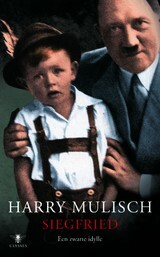Take a photo of a barcode or cover
Ik heb dit boek gelezen toen ik 17 was, en vond het toen echt geweldig. Nog steeds vind ik het idee en verhaal geweldig; Hitler en alle verhalen/mensen om hem heen zijn heel interessant. Maar ik heb 7 jaar later moeite met de soort tentoonstelling van Muslisch’ ‘intellectualiteit’ en het ‘mannelijke perspectief’. De hoofdpersoon is niet uit te staan, een vals bescheiden, vrij arrogante man. Die zijn eigen boek meeneemt als cadeau. Met een vrouw/vriendin die volledig aan hem toegewijd is en meer fungeert als assistent. Hierom ook steeds meer moeite met ‘de grote 3’..
Los daarvan vind ik de filosofische heel intrigerend en het verhaal geweldig bedacht, dus toch 4 sterren.
Los daarvan vind ik de filosofische heel intrigerend en het verhaal geweldig bedacht, dus toch 4 sterren.
emotional
mysterious
reflective
tense
medium-paced
Plot or Character Driven:
Plot
Strong character development:
Complicated
Loveable characters:
No
Diverse cast of characters:
No
Flaws of characters a main focus:
Yes
Zolang de hoofdpersoon z'n mond houdt, is het nog niet eens zo slecht.
informative
slow-paced
Plot or Character Driven:
Character
Strong character development:
Complicated
Loveable characters:
Complicated
Diverse cast of characters:
Complicated
Flaws of characters a main focus:
Yes
adventurous
dark
emotional
inspiring
mysterious
reflective
sad
tense
medium-paced
Plot or Character Driven:
Character
Strong character development:
Yes
Loveable characters:
Complicated
Diverse cast of characters:
Complicated
Flaws of characters a main focus:
Complicated
Rond uit geweldig. Een beschrijving doet geen recht toe.
What if Hitler and Eva Braun had a baby, and gave that baby to another couple to raise as their own? What if a famous author stumbled on this information, and was entrusted with it by the erstwhile parents, and promised to not share this information until the parents' deaths? What if a not-so-famous author wrote the story of the famous author and the Hitler baby, and made such a mess of it, you (as the reader) swore never to read his work ever again? Sheesh. 1 star out of 5.
It begins as the story of Rudolf Herter, an internationally renowned Dutch author (funnily enough, he bears a striking similarity to one Harry Mulisch). Like Mulisch, Herter has an Austrian heritage behind his Dutch citizenship, a father who was too close to the Nazis in occupied Holland, and high esteem as an author. More importantly for this tale, both share preoccupation with the phenomenon of Hitler.
Mulisch/Herter feels he hasn't grasped the subject of Hitler. Indeed, it is clear that he believes that all attempts to explain Hitler have failed completely. In Siegfried it occurs that perhaps fiction is the net in which to catch his elusive subject. Not historical fiction, but using some very unlikely (but still fundamentally plausible) idea and building a fiction around it. So in this way, we have a philosophical thesis trapped within novel within trapped within a novel.
Do you follow?
As I usually do when reflecting on a book, I had a bit of a look at the reviews of Siegfried. And oh my critics didn’t like it. It got mauled.
I'm not sure why. As a story, I found it gripping. As a philosophical treatise, interesting enough. Sure, the self-reflexivity is a little smug at times, but unlike others, this is more self-mutilation than adoration.
Does it answer the riddle of Hitler? Of course not, but that is kind of the point. What’s more important is the reflection along the way.
Very much worth the effort.
Mulisch/Herter feels he hasn't grasped the subject of Hitler. Indeed, it is clear that he believes that all attempts to explain Hitler have failed completely. In Siegfried it occurs that perhaps fiction is the net in which to catch his elusive subject. Not historical fiction, but using some very unlikely (but still fundamentally plausible) idea and building a fiction around it. So in this way, we have a philosophical thesis trapped within novel within trapped within a novel.
Do you follow?
As I usually do when reflecting on a book, I had a bit of a look at the reviews of Siegfried. And oh my critics didn’t like it. It got mauled.
I'm not sure why. As a story, I found it gripping. As a philosophical treatise, interesting enough. Sure, the self-reflexivity is a little smug at times, but unlike others, this is more self-mutilation than adoration.
Does it answer the riddle of Hitler? Of course not, but that is kind of the point. What’s more important is the reflection along the way.
Very much worth the effort.
informative
reflective
medium-paced
Plot or Character Driven:
Character
challenging
emotional
reflective
sad
medium-paced
Plot or Character Driven:
Plot







